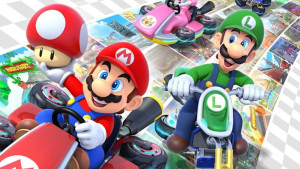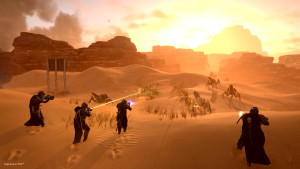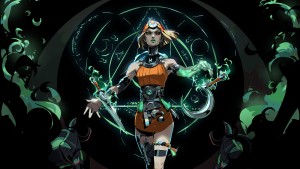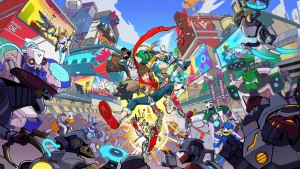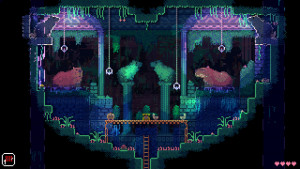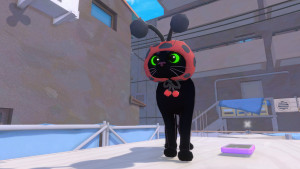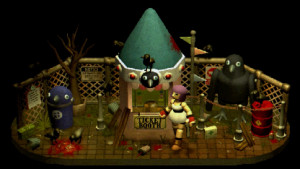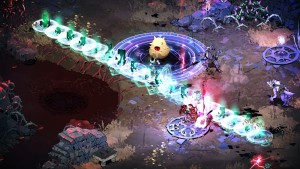Please support Game Informer. Print magazine subscriptions are less than $2 per issue
Opinion – How Guitar Hero Live’s Microtransactions Sour The Experience

Music discovery is one of the main reasons I enjoy Guitar Hero and Rock Band. With Guitar Hero Live’s TV mode, FreeStyle Games and Activision implemented a system that requires you to earn on-demand song plays by playing on streaming channels. I was originally excited at the prospect of being forced to play songs I was unfamiliar with in order to play songs I wanted to play. Unfortunately, the currencies in GHTV are too convoluted for their own good and too often get in the way of allowing the player to just enjoy the otherwise solid gameplay of Guitar Hero Live.
Over the past decade, I’ve been a massive fan of the Guitar Hero and Rock Band franchises. I’ve wowed my coworkers with rundowns of how much money I’ve spent on games, instruments, and downloadable content between both of the series. Even as a money-deprived college student, I didn’t hesitate to spend $2 if it meant providing my friends and me with a more enjoyable experience.
Perhaps that’s why when I heard that when Guitar Hero Live would feature microtransactions in its GHTV mode, I wasn’t particularly worried. The game delivers more than 40 songs in its offline Live mode, and hundreds of songs in TV mode at launch with the promise of free additions in the future. Meant to replace traditional DLC, this mode allows you to select channels and play along, or play what you want to play using the on-demand song plays.

Earning song plays is as simple as playing along with the streaming channels. As you level up in “status,” you are rewarded with in-game currency and song plays. Should you want to play more songs than you are rewarded, you can use your earned in-game currency to purchase additional plays. If you are having friends over or want unfettered access to GHTV’s robust catalog, you can buy a Party Pass, which unlocks the entire library for 24 hours for $6. If all of those options fail to sate your desire to play the songs you want to play in the mode, you can then opt to spend real money.
Conceptually, it’s upsetting for someone like me who has always liked playing the same song over and over to master the most difficult sequences, but I understood that GHTV is meant to replace traditional DLC with a service that takes heavy inspiration from streaming-music services like Spotify. Unfortunately, GHTV doesn’t borrow enough from Spotify and ends up taking too much from free-to-play style games.
When it works, it feels like a true evolution of post-release content delivery. I sometimes even enjoy tuning into the channels and earning coins – it encourages me to branch out and discover new music. If the currency were limited to just song plays, it would probably work all the time. Sadly, FreeStyle and Activision tied the in-game currency to too many components of the mode, and it feels like a free-to-play game as a result.

In addition to song plays, you can use earned tokens to buy cosmetic upgrades to your profile, like player cards and note highways. The most intrusive implementation of the in-game currency is the Hero Power abilities. Using the same in-game currency that is used to purchase song plays, you can purchase different Hero Power abilities. These aren’t just one-time purchases, though. Instead, you use the tokens to buy packs of uses. That’s right; Guitar Hero Live more or less charges you per use of most Hero Powers in GHTV. This means that unless you want to use the worst Hero Power (it actually stops you from playing along with the song for several seconds), you have to decide if you want to put your money towards premium Hero Powers or accruing song plays.
These premium Hero Powers include the “double multiplier” power, which has been a series standard since its inception in 2005. Without that power, it is extremely difficult to grab the top spot of the leaderboard or even score five stars on a song. In addition, you can use the same in-game currency to purchase upgrades for your guitar that help you score higher. With all of these different power-ups pulling from the same currency, it means that those who top the leaderboards are often the players who have prioritized achieving high scores over playing the songs they want to play (or have spent real money to do both).
If you want the best of both worlds, you can pour real money into the game via another in-game currency. This “Hero Cash” can be used to buy song plays or unlock special Premium Shows. Playing particular songs and hitting certain milestones in them can also unlock Premium Shows, but if you want to play those songs – you guessed it – you’ll need to burn a song play.
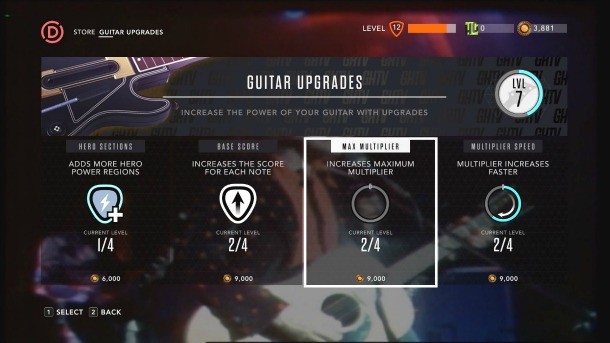
Even with the annoying in-your-face purchasing pushes from the developers, GHTV could be more cost effective than the competition. If you were to buy the number of songs delivered by GHTV through Rock Band 4 downloadable content, it would take several weeks worth of Party Passes in order to equal the amount of money it would cost to buy hundreds of downloadable songs in Rock Band 4. The advantages Rock Band 4 has over GHTV in this department, however, is that when you’re buying DLC, you’re able to choose the songs you want, plus you own those songs for the life of the game. With GHTV, the mode’s catalog is a bundled deal, while you own nothing that you purchase.
As it stands now, GHTV is a cool idea weighed down by the frustration of trying to balance your token budget as you decide whether you want to play the song you want to play or perform better through buying uses of powerful Hero Powers. I still enjoy playing Guitar Hero Live, but when it comes to long-term playing and spending real money, I see myself leaning toward Rock Band 4.

